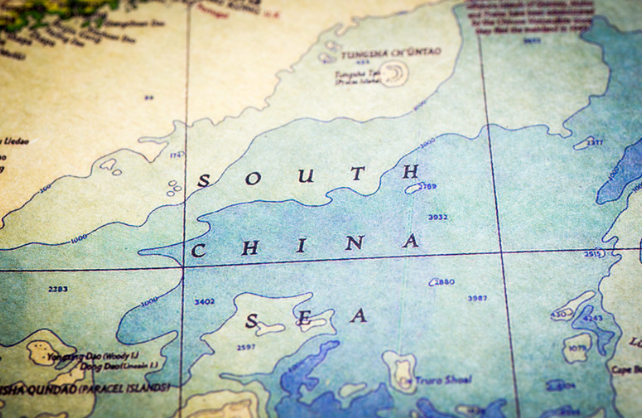UN Security Council Emergency Session
On Tuesday, the United Nations Security Council convened an emergency session to discuss the rising tensions in the South China Sea. The need for this meeting arose after an alarming incident involving a near-collision of U.S. and Chinese naval forces near the Spratly Islands. This escalation has fueled fears of a potential military confrontation not only between the U.S. and China but also involving other nations in the region. The session highlighted the urgency of addressing disputes in this crucial maritime area, known not only for its strategic significance but also as a vital route for international trade.
Urgent Call for Restraint
UN Secretary-General António Guterres opened the session by emphasizing the need for restraint from all involved parties. He stated, “The South China Sea is not only vital for international trade but also for regional and global stability. It is imperative that all nations resolve their disputes through dialogue, not aggression.” His statement set the tone for the session, underscoring the dire implications of the ongoing tensions and the necessity of diplomatic engagement.
Heated Exchanges Between U.S. and China
The Security Council session featured intense exchanges, particularly between the U.S. and Chinese representatives. U.S. Ambassador Linda Thomas-Greenfield accused China of engaging in “reckless and destabilizing actions” that jeopardize international law and global security. Thomas-Greenfield asserted that China’s behavior poses not just a challenge to the United States but also to the rules-based international order. In response, China’s Ambassador Zhang Jun rebuffed the U.S. allegations, claiming that the U.S. is the real provocateur in the South China Sea, attempting to contain China’s rise and interfere in its sovereign affairs.
Regional Reactions and Concerns
The deteriorating situation has sparked significant concern among Southeast Asian nations, many of which hold territorial claims in the contested waters. The Association of Southeast Asian Nations (ASEAN) has called for an emergency summit, with various member states urging both the U.S. and China to exercise restraint. Indonesian President Joko Widodo, the current chair of ASEAN, emphasized the importance of keeping the South China Sea as a “sea of peace, stability, and cooperation.” Additionally, countries such as Japan, Australia, and the Philippines have expressed solidarity with the U.S., highlighting the necessity of adhering to international law. In contrast, Malaysia and Vietnam called for a multilateral approach to resolving the ongoing crisis.
Economic Impacts of Escalating Tensions
The mounting tensions have triggered immediate economic repercussions. The MSCI World Index saw a decline of 1.8% on the day of the UN session, reflecting investor anxiety regarding potential disruptions in the region. Furthermore, oil prices have surged due to fears surrounding the stability of shipping routes that traverse the South China Sea. According to market strategist Elena Grayson of Morgan Stanley, “Investors are rattled by the prospect of a prolonged standoff between the U.S. and China. The South China Sea is a vital artery for global trade, and any instability there has far-reaching implications.”
Efforts Toward Diplomatic De-escalation
In light of the heightened tensions, diplomatic efforts are being pursued to alleviate the crisis. Notably, U.S. Secretary of State Antony Blinken is set to meet with Chinese Foreign Minister Wang Yi in Geneva later this week for direct discussions. Blinken conveyed a crucial message, stating, “This is a moment where diplomacy must prevail. The stakes are too high for miscalculation or escalation.” This reflects a recognition on both sides that continued conflict could have devastating consequences, leading to a more serious confrontation in the future.
Long-term Geopolitical Implications
Experts caution that the current tensions in the South China Sea could have enduring effects on U.S.-China relations and the broader geopolitical landscape. Dr. Emily Chan, a professor of international relations at the University of Singapore, remarked, “This crisis underscores the fragility of the current U.S.-China relationship. While both sides may seek to avoid open conflict, their competing interests in the region make sustained cooperation increasingly difficult.” Such a dynamic may contribute to an environment of tension and mistrust that could affect future international relations.
Conclusion
The ongoing situation in the South China Sea serves as a critical point for international diplomacy, maritime law, and global stability. As the world observes the developments, the key will be whether the involved nations can prioritize dialogue over confrontation to avoid a deeply destabilizing conflict. This crisis not only tests their diplomatic endurance but also the resilience of international norms that govern such contentious relationships.
FAQs
What caused the recent tensions in the South China Sea?
The tensions were exacerbated by a near-collision between U.S. and Chinese naval forces near the Spratly Islands, raising concerns of a military confrontation between the two nations.
What is the role of the United Nations in this crisis?
The United Nations Security Council convened an emergency session to discuss the situation and to urge restraint and dialogue among the involved countries in order to maintain peace and security.
How are regional countries responding to the conflict?
Southeast Asian nations have expressed concern, with ASEAN calling for an emergency summit. Countries like Japan, Australia, and the Philippines have shown support for the U.S., while Malaysia and Vietnam seek multilateral solutions to the crisis.
What economic effects could arise from the ongoing tensions?
Market responses have included a decline in the MSCI World Index and rising oil prices due to fears of disruption in vital shipping routes in the South China Sea, impacting global trade.
Are there diplomatic efforts underway to resolve the crisis?
Yes, there are diplomatic initiatives in progress, including planned meetings between U.S. Secretary of State Antony Blinken and Chinese Foreign Minister Wang Yi to seek a peaceful resolution.

